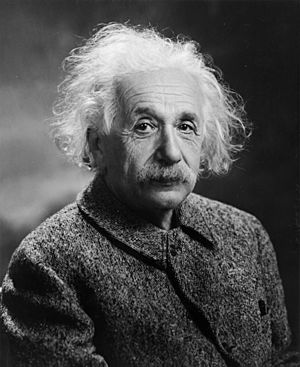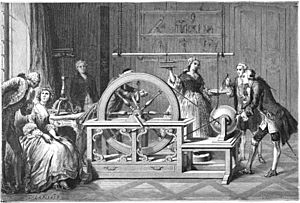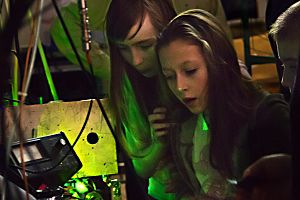Physicist facts for kids


A physicist is a scientist who studies physics. Physics is all about how the universe works. It looks at how matter (everything around us) and energy interact. Physicists try to understand everything from tiny sub-atomic particles to the entire universe.
Physicists are curious about why things happen. They often use mathematics to explain their ideas. There are two main types of physicists:
- Experimental physicists do experiments and observe what happens. They collect data and analyze it.
- Theoretical physicists use math and logic to create models. These models help explain why things happen and predict what might happen next.
Physicists also use their knowledge to solve real-world problems. They can develop new technologies. This is sometimes called applied physics or engineering physics.
Contents
What Do Physicists Study?
Physicists explore many different areas. They study things that are very, very small and things that are incredibly huge.
The Very Small
- Particle physics: This field looks at the smallest building blocks of the universe. These are particles like quarks and leptons.
- Quantum physics: This area studies how energy and matter behave at the atomic and sub-atomic levels. It's a bit strange, but it helps us understand things like lasers and computer chips.
Everyday Physics
- Mechanics: This is about how objects move and the forces that make them move. Think about throwing a ball or how a car works.
- Thermodynamics: This studies heat and temperature. It explains how engines work or why ice melts.
- Electromagnetism: This field looks at electricity and magnetism. It helps us understand light, radio waves, and how motors work.
The Very Big
- Astrophysics: This is the study of stars, planets, galaxies, and other objects in space.
- Cosmology: This field tries to understand the origin, evolution, and future of the entire universe.
Famous Physicists
Many brilliant people have been physicists. Here are some of the most well-known:
- Albert Einstein
- Archimedes
- Benjamin Franklin
- Blaise Pascal
- C. V. Raman
- Enrico Fermi
- Erwin Schrödinger
- Galileo Galilei
- Henri Poincaré
- Isaac Newton
- James Watt
- Johannes Kepler
- Julius Robert Oppenheimer
- Leó Szilárd
- Marie Curie
- Max Planck
- Niels Bohr
- Nikola Tesla
- René Descartes
- Richard Feynman
- Satyendra Nath Bose
- Stephen Hawking
- Werner Heisenberg
Images for kids
See also
 In Spanish: Físico para niños
In Spanish: Físico para niños
 | Ernest Everett Just |
 | Mary Jackson |
 | Emmett Chappelle |
 | Marie Maynard Daly |



